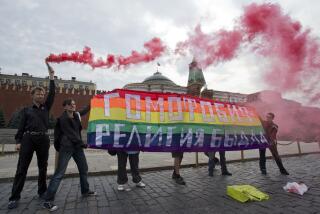Soviets Hail Rights--but Deny Permit
- Share via
MOSCOW — The Soviet government took note Thursday of Human Rights Day by announcing that “human rights and liberties should be given ever greater prominence.”
At the same time, the authorities denied an unofficial human rights group a permit to meet in a public hall. The group then assembled in a cramped apartment near the Moscow River.
The human rights statement, issued by Deputy Foreign Minister Anatoly Adaminshin at a news conference, said: “Heightened attention to the problem is just as important as progress in such fields as disarmament, economic cooperation and ecology.”
Adaminshin said that the Soviet Union, in its relations with the United States, “is seeking to go over from mutual recriminations to regular dialogue, and has made a number of specific proposals for humanitarian cooperation.”
He said that such cooperation should respect the basic laws of both countries, then added, “This does not mean, though, that these laws are something given once and for all.”
While Adaminshin was calling for an expansion of human rights, a group specializing in the subject was denied a place to meet. The group calls itself “Press Club Glasnost,” after Soviet leader Mikahil S. Gorbachev’s policy of glasnost, or openness. It was organized to determine how far glasnost extends.
Several weeks ago, the group applied for a permit to conduct an international seminar from Dec. 10 to 13. Topics were to include a wide range of subjects, from the theoretical to the practical, all involving human rights.
Turned Away From Hall
The application was made before the dates of the Washington summit were announced, and the group tentatively hired a banquet hall in one of the residential areas north of the city center. Organizers of the seminar said the authorities suggested that the dates be changed, but this was impossible because participants were expected from abroad.
Then, a few days ago, they said, they were told that it was impossible to use the banquet hall because it was being cleaned in preparation for a “sanitary” inspection.
The organizers said that four human rights activists coming from the Ukraine were taken off a Moscow-bound train in the city of Lvov and held on drug abuse charges. Other foreign participants were unable to get entrance visas.
The seminar coordinator, Lev Timokfeyev, said the Moscow authorities warned them that if they went ahead with the seminar the participants could face prosecution under a law banning illegal demonstrations.
Outside the closed banquet hall Thursday evening, activists handed out the address of an apartment on the other side of Moscow. Later, at the apartment, with speakers in the living room and listeners crowded into the dining room and bedrooms, the organizers tried to get the seminar under way.
The principal speaker was Larissa Borgoraz, one of the oldest veterans of the civil rights activists who marched on Red Square in 1968 to protest the Soviet invasion of Czechoslovakia.
Later, outside the overheated apartment, she said: “It would be much better if we could hold this seminar in proper surroundings. I don’t blame Gorbachev’s government for keeping us out . . . . To me, it is really necessary to wake up the society, to rid ourselves of this apathy.
“We need to get our human rights movement going again. I don’t hope for great changes for the better, just some improvement. That’s good enough.”
More to Read
Sign up for Essential California
The most important California stories and recommendations in your inbox every morning.
You may occasionally receive promotional content from the Los Angeles Times.













